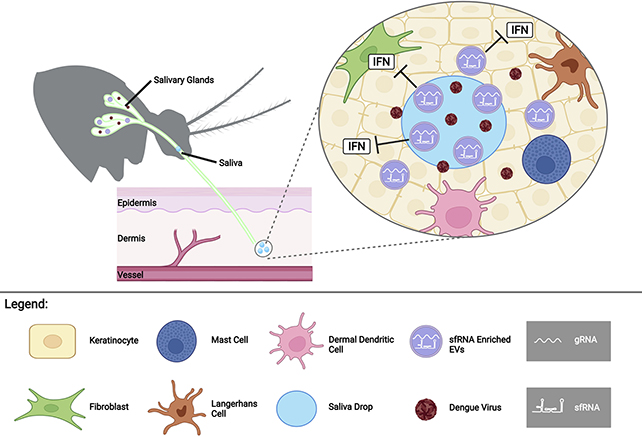We know mosquitoes are a serious danger to our wellbeing as human beings– in truth, they are the world’s deadliest animal, with mosquito-borne ailments responsible for extra than a million deaths a calendar year.
And it is really not just their bites that we need to worry about. New exploration displays how the saliva of a mosquito carrying the dengue virus is loaded with a material that could suppress our immune process response and increase the hazard of infection.
By 3 individual analysis techniques, experts identified a certain type of viral RNA, or chemical messenger, identified as sfRNA in the infected mosquito saliva. It primarily blocks the defense mechanisms the human overall body places up in opposition to infection.

“It’s incredible that the virus can hijack these molecules so that their co-shipping and delivery at the mosquito bite site provides it an edge in establishing an infection,” claims biochemist Tania Strilets from the College of Virginia.
“These findings provide new perspectives on how we can counteract dengue virus bacterial infections from the extremely initial chunk of the mosquito.”
The sfRNA is loaded in membrane compartments known as extracellular vesicles, prepared for shipping and delivery. The dengue virus seems to “subvert mosquito biology”, in the phrases of the scientists, to give it a improved chance of spreading.
In checks on immortalized cell lines, the workforce verified that this sfRNA payload did in truth improve virus infection ranges – laying the groundwork so that the human entire body isn’t rather so well geared up for assault.
These sfRNAs have been spotted before in insect-borne viruses, including Zika and yellow fever. Their position, more typically, appears to be to get in the way of the chemical signaling applied by the entire body as the virus replicates.
“We propose that by introducing this RNA at the biting internet site dengue contaminated saliva prepares the terrain for an economical infection and gives the virus an benefit in the to start with struggle concerning it and our immune defenses,” produce the scientists in their released paper.
Dengue is a really serious concern, with around 400 million people infected each calendar year – and reinfection is doable. Indicators contain fever, nausea, and a skin rash in a modest selection of situations, it can direct to inner bleeding or even demise.
Proper now, you will find no way of managing the virus, only methods for controlling the indications. While we’re nonetheless some way from a drug to address dengue, comprehension far more about it and how it spreads is vital in fighting it.
The staff is hopeful that its discovery can lead to far better preventive actions in opposition to the dengue virus proper from the second of an infection, but the very best way of retaining by yourself risk-free continues to be the similar as before: keep away from finding bitten.
“There is no doubt in my head that better understanding of the fundamental biology of transmission will ultimately lead to efficient transmission-blocking measures.” suggests virologist Mariano Garcia-Blanco, from the College of Virginia.
“Our results are nearly definitely likely to be relevant to bacterial infections with other flaviviruses. The unique molecules below are not likely to apply to malaria, but the concept is generalizable to viral infections.”
The exploration has been revealed in PLOS Pathogens.






